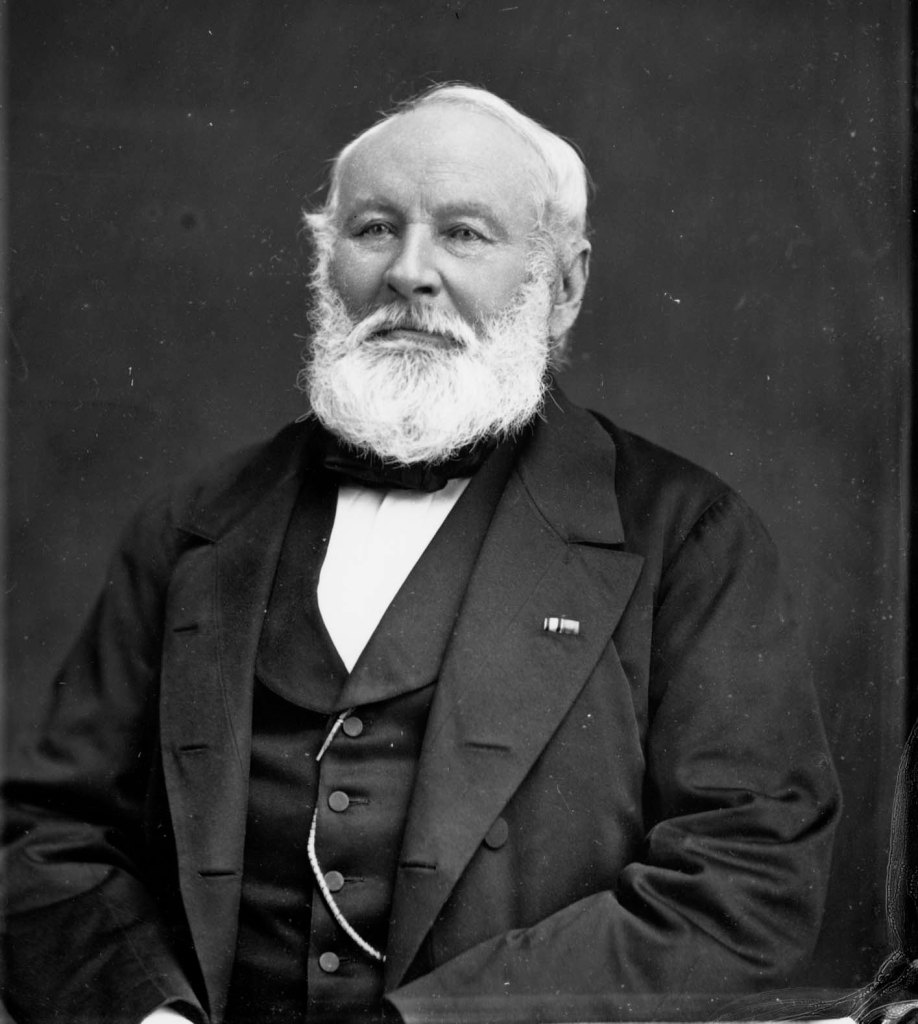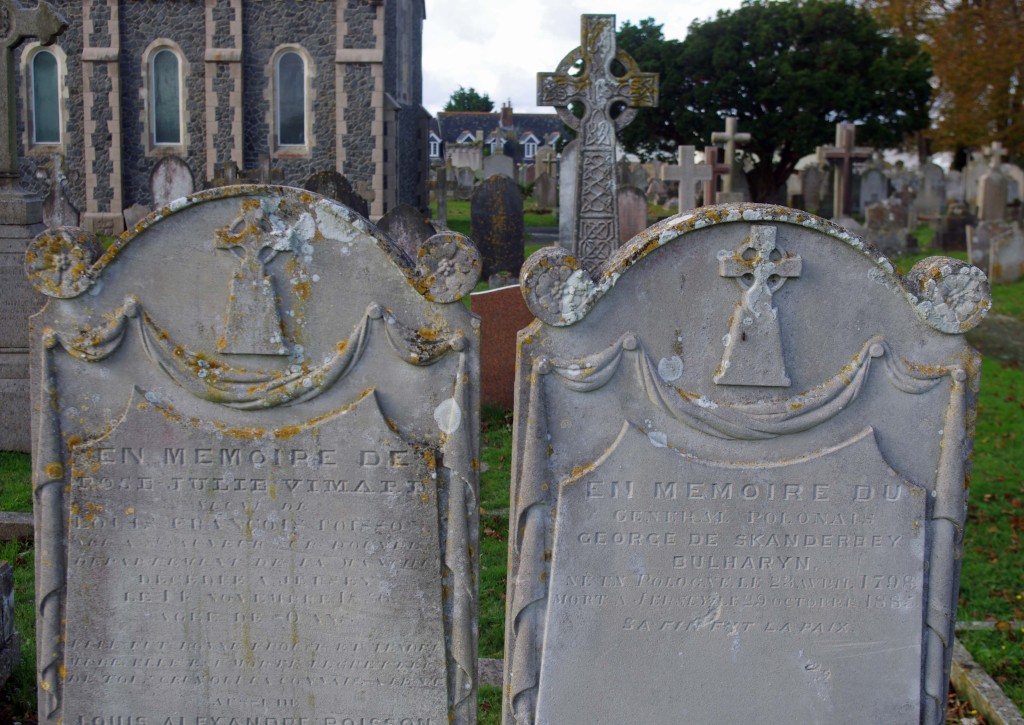
Jerzy “George” Skanderbeg Bulharyn born in Plaskowce in the Grodno region of Belarus, after his involvement in the “Spring of Nations” in the Hungarian Revolution he took refuge in Turkey, from where he sailed to Southampton arriving there in June, 1851 (1) , he retired to Jersey in 1852, where he wrote “Rys wojny węgierskiej” (Sketch of the Hungarian War) published Paris 1852, “Regulamin dla kawalerii polskie” (Polish Cavalary Regulations) in 1864.
Bulharyn is on 1871 census at Georgetown, and the 1881 census he is living at “Milton House” Georgetown, as in 1871 census he is boarding with a family originally from France called Poisson, he is buried next to the family at Almorah, this property no longer appears to exist. The following account from “The story of Jersey Freemasonry” by Colin R Goss.
The following is an application for funds from the local masonic lodge: the petitioner was George Bulharyn who was a Polish émigré aged 62 belonging to a French lodge, La Loge de St. Jean. He had already been relieved by Loge La Césarée to the amount of £2:
I George Bulharyn beg leave to illustrate my request, refraining from touching upon my topic out of the province of Freemasonry. By birth a Pole, aged 62 years, I took an active part in the war for Independence of Poland in 1831 against the Russian opposition. You know my worthy brethren, too well the history of that awful drama. Having failed our national endeavours, we left our native land. France offered us its hospitality. Besançon (Department du Doubs) was fixed for my depot, and there I was initiated on the 16th May 1832 in the lodge called “Constant Amitié” into the mysteries of Freemasonry.
In 1833 I was obliged to abandon the French territory and went to Galicia; a few months after I found shelter in Hungary where I remained until 1848. At that period Hungary rose in arms – I espoused its cause and fought its battles as General of a corps d’armie. Its national army being overpowered by Russians and Austrians, we were forced to refuge in Turkey.
The Government of the Sultan sent me in company of the illustrious Kossuth, Mezaros (2), and Perezil to . After Kütahya two years of our captivity being liberated, we set our foot on the free soil of England. In Jersey I have written a critical history of the Hungarian War and caused it to be printed, hoping to benefit by its sale, but unfortunately several hundred of the volumes were seized by the Police of Hamburg. That occurrence struck a fatal blow to my prospects. After having exhausted the last resources for the printing and my personal property having been sequestered by the late Emperor Nicholas. I find myself now reduced to such a low ebb as to claim the assistance of my brethren.
I have not the least doubt that acting upon the broad basis of “brotherly love relief and truth” you will take my distressed case into your Benevolent and Masonic consideration and grant me such relief as in your wisdom you may deem sufficient to soothe my sufferings and for having tendered your brotherly hand to me. I will as in duty bound, ever invoke the assistance of the Grand Architect of the Universe on all your undertakings.
The Royal Sussex Lodge supported the petition although most the signatures are those with positions in Provincial Grand Lodge, including the Deputy Provincial Grand Master. The petition was approved unanimously, and yet W.Bro Du Jardin protested against the decision on the grounds of illegality. The Provincial Grand Secretary under those unusual circumstances withdrew the petition.
In order to spare the feelings of the petitioner, who could not hear except with sorrow that a contest between the Worshipful Lodge of Benevolence and the Provincial Grand Treasurer should be carried on before the Grand Lodge of England on his account.

Military Career
He graduated from a school in Sejny . In 1817 he joined the 2nd Regiment as a soldier, in 1818 he was a non commissioned officer, 1820 he was at Cadet School, 1822 Second Lieutenant, 1826 dismissed for family reasons. Took part in the 1830 Uprising. Served under Jozef Chlopicki, organising two cavalary regiments, in 1831 he took part in the Battle of Ostrołęka led by General Skrzynecki, for his actions there he was rewarded with promotion to Major and given charge of the 7th Uhlan regiment, awarded the Gold Cross number 1808. Under General Łubieński he fought at the Battle of Nur . As Major of the 1st regiment of the Augustów cavalry he rejected the Russian truce with amnesty. In October 1831 with Warsaw having surrended, Bulharyn under General Rybiński retreated across into Prussia. Early in 1832 Bulharyn moved to Besançon in eastern France, and then in 1833 to Hungary.
In 1846 he became involved in the Krakow Uprising campaign and led a failed attack on the Sanok area, gains notoriety throughout Europe for this action. In the autumn 1848 he offered to create a Polish Legion for Hungarian leader Lajos Kossuth, in December Bulharyn was made Commander in Chief of the Polish troops, January 1849 made Colonel, then Brigadier, and Division Commander of the Upper Tisza Corps. Engages in battles against the Imperial Corps led by General Franz Schlik. In March he is directing Battalions in Debrecen, becomes Deputy Legion Commander under General Wysocki. July awarded the Military Medal 3rd class for his actions in the Battle of Tarcal, at the end of the war Lajos Kossuth promotes him to General and awards him a Military Medal 2nd class. At the end of the campaign he retreats to Vidin. And eventually seeks safety in Turkey.
Associations, Societies, and movements
Founder of the Carbonari society in Lviv, Ukraine. 1832 initiated into the masonic lodge “La Constante Amitié” at Besançon. 1832 joined the “Polish National Committee“, said to have known fellow member Joachim Lelewel. When travelling through Asia Bulharyn was granted entry to sacred temples by giving masonic signs (Masonic Mirror 1868). April 1832 at Besançon founded the “Fraternal Unity Society”. 1832 moved to Paris then Strasbourg before going to Galicia, in 1839 and 1841 there were extradition proceedings against him, but he remained there till 1848.
Family
Married 1832 at Prusy: Karolina Rogalska 1806-1889 sons: Jerzy Teodor Bulharyn 1844-1913, Adam Stefan Bulharyn 1846-1884, daughters: Jadwiga Kremer Bulharyn 1835-1897, Marja Bulharyn, Wanda Bulharyn, Sofja Ewa Bulharyn. None of the family appeared to be with Jerzy in Jersey, and he would not have been allowed to return to Poland safely.
Notes
(1) The regular English steamer left Constantinople on the 19th of June with 140 refugees on board 80 were Hungarian, and 30 were Polish, the following is a list of the “high chararcter” Poles on board: General George Bulharyn, Colonels Ladislas Tcharznicki, Thadee Idzikowski, Majors Adolph Grochawalski, Constan Matezynski, Sev. Blezynski and Severin Thorzelinski, Joseph Niewiadomski, a clergyman; Leonard Haszek, captain; eight lieutenants, four sergeants, and three ladies.
(2) Lázár Mészáros spent the summer of 1853 in Jersey.

